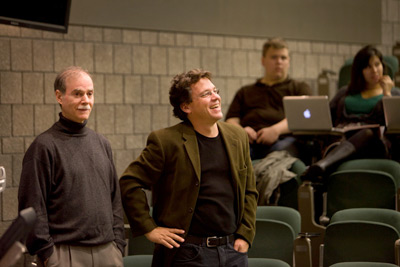'Six Pretty Good Books' will become a Cornell MOOC
By Bill Steele

Four professors have received funding from Google to launch a Cornell MOOC (Massive Open Online Course). Six Pretty Good Books: Explorations in Social Science (HD 2840) will soon be offered online, for free.
Taught by Michael Macy, the Goldwin Smith Professor of Sociology; Stephen Ceci, the Helen L. Carr Professor of Human Development; Jefferson Cowie, professor of collective bargaining, law and history; and Jeffrey Hancock, associate professor of communication, the course is part of the University Courses initiative, a group of classes that cross disciplines and departments and are open to students in any college.
"University Courses are terrific options for Cornell MOOCs," said Laura Brown, vice provost for undergraduate education, "because they feature cross-disciplinary exploration, a signature educational opportunity at Cornell."
Six Pretty Good Books explores the social sciences through books by prominent authors including Steven Pinker, Nicholas Christakis, Robert Frank, Duncan Watts and Dan Ariely. After reading each book, students join in debate among the instructors and the authors, who come to the classroom through videoconferencing.
More than 200 MOOCs are now available online, many from prestigious universities, with a single course often enrolling tens of thousands of students. The courses are free, but some providers charge for a certificate of completion. The idea originated at Stanford University, where an online computer science course enrolled 160,000 students worldwide and launched a movement that promoters speak of as "democratizing education."
Last fall, Provost Kent Fuchs and Joseph Burns, dean of the faculty, appointed a committee, chaired by Éva Tardos, the Jacob Gould Schurman Professor of Computer Science, to consider whether Cornell should offer MOOCs. The committee recommended that Cornell encourage faculty to develop MOOCs, provide funding for MOOC development and create a faculty committee to select suitable courses, Tardos reported.
"We want faculty to experiment with this new medium of teaching," she said. "In addition to offering content to a lot of people, they also will learn how this online medium works."
The committee also recommended that Cornell join one of the consortia that distribute MOOCs, such as EdX, founded by Harvard University and the Massachusetts Institute of Technology and now including four other institutions, or Coursera, with courses from 33 universities.
"This is a faculty-led effort," Fuchs said. "MOOCs provide an opportunity for the faculty to explore new approaches to education, and to collaborate with faculty from other universities through the MOOC consortia. It benefits our students on campus, enhances our visibility and expands our land-grant mission by providing educational opportunities around the world."
Two things are needed to make a MOOC, Tardos said: a course with great general appeal and a willing instructor. What's in it for the instructor? "Most of us are in the business to educate people," she said. "You reach more students in a single MOOC than you ever reached in 20 years of teaching."
The MOOC version of Six Pretty Good Books will be supported by a $50,000 grant from Google, which shares online teaching innovations through its Course Builder website. "We will be creating new methods and ideas for scaling this kind of social science class to an online audience," Hancock said.
The instructors will develop new software to consolidate student questions for online Q&A sessions with the authors and to facilitate "peer grading." As in many MOOCs, students will grade each other's essays and discussion-group participation, and this provides a valuable educational experience in itself, Ceci noted. "By reading, thinking about and grading peers' papers, students realize what an excellent essay looks like and they also see what is poorly conveyed in a not-so-good essay," he explained. "They eventually begin to see their essays as others see them." Discussion groups will meet online and use social media like Facebook and Twitter for discussion that may involve people outside of the course.
"We believe this course is an ideal opportunity to leverage MOOC technology to allow thousands of students to participate in a conversation with some of the world's most prominent social scientists," the instructors said in their proposal, "while offering these authors the opportunity to talk about their work one-on-one with a worldwide student audience."
Whether or not this is Cornell's first MOOC may depend on how you count. A free online course on infant feeding offered by the Division of Nutritional Sciences attracted more than 3,800 participants worldwide and was dubbed a "mini-MOOC," and eCornell, the university's for-profit distance learning subsidiary, is about to launch a free online marketing course as part of its hospitality program.
Media Contact
Get Cornell news delivered right to your inbox.
Subscribe